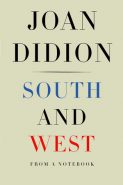
Book Review: South and West by Joan Didion
Reviewed by BJ Hollars

South and West: From a Notebook
Essays by Joan Didion
Knopf, March 2017
$21.00; 160 pp.
ISBN-13: 978-1524732790
In the opening lines of Joan Didion’s canonical essay, “On Keeping a Notebook,” she offers a quotation from a seemingly incomprehensible note scribbled some time before. “Since the note is in my notebook,” she explains, “it presumably has some meaning to me.” Didion goes on to translate her scrawl, revealing to readers (and budding writers) just how observation works. She adds, too, that no matter how “dutifully we record what we see around us” we always circle back to the “implacable ‘I.’”
Yet in her latest, South and West: From a Notebook, Didion pushes herself to the periphery, offering her notes unadorned, unannotated, and often without the aforementioned “I.” Her written observations span two assignments: a 1970 road trip through the South, and a 1976 attempt to cover the Patty Hearst trial in California; neither of which yielded the words they were meant to. What emerged instead were fragments, which, as Nathaniel Rich rightly argues in his foreword, “surpass in elegance and clarity the finished prose of most other writers.”
The majority of the book centers on Didion’s road trip through the South, a journey inspired by her theory that by understanding the South she might come to know California better, too. Readers sit shotgun throughout, becoming privy to an array of Didion’s insights, many of which she arrives upon by way of all the usual tools of nonfiction: eavesdropped dialogue, brief encounters, interviews, observations and reflections. Of Mississippi she writes of the “solidarity engendered by outside disapproval,” and suddenly readers understand the often offensive defensiveness that came from being the nation’s punching bag. While sitting poolside at a Howard Johnson’s in Meridian, Mississippi, she writes of feeling “the euphoria of Interstate America,” and once more, readers find themselves nodding their heads, accustomed to this strange sameness that stretches throughout the country. Of watching a black maid toss a baseball with a five-year-old, she describes the ball’s flight as “suspended in amber.” And perhaps this is her best observation of all; not only because it captures the scene, but because it captures the essence of her book. Didion’s notes, too, feel suspended, a sepia-tone tinge glossing every word. Yet simultaneously—and in spite of this—her words still seem fresh, relevant, perhaps even prescient.
Joan Didion has always known what nonfiction writers must: that when writing about place, we must write about people, too. Nearly half a century removed from her initial scrawls, she reintroduces readers to a place we thought we knew, and to the people we ought to have known better. Though these reintroductions come much too late, we’re still glad to have made the acquaintance.
B.J. Hollars is the author of several books, most recently Flock Together: A Love Affair With Extinct Birds, From the Mouths of Dogs: What Our Pets Teach Us About Life, Death, and Being Human, as well as a collection of essays, This Is Only A Test. Hollars serves as a mentor for Creative Nonfiction, a contributing blogger for Brain,Child and the founder and executive director of the Chippewa Valley Writers Guild. An associate professor of English at the University of Wisconsin-Eau Claire, he lives a simple existence with his wife, their children, and their dog. For his writing, visit www.bjhollars.com; for his podcasts, visit www.snippetspodcast.com.

Leave a Reply